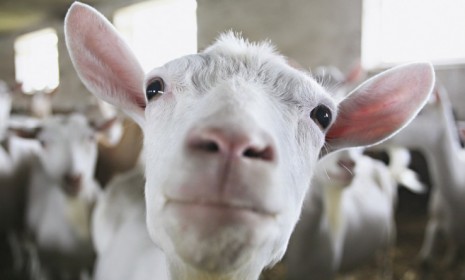Do goats have accents?
Humans from Texas and Canada sound quite different. Is the same true for our bleating, four-legged pals?

"Surely you've noticed," says Eyder Peralta at NPR, "that when people move from place to place and stay for a while, they tend to pick up the local accent." Apparently, the same is true for goats. A new study from Queen Mary University in London suggests that — like whales, dolphins, and bats — goats modify the sounds they make in order to fit in with their immediate environment. Here, a brief guide to the research:
Wait. Goats talk to one another?
Not in so many words. But they "are social animals that live in groups, and make 'contact calls' to one another to stay in touch," says Wynne Parry at LiveScience. Young goats, known as "kids," pick up these bleats from the other members of their social circle. It's a "rudimentary form of vocal learning."
The Week
Escape your echo chamber. Get the facts behind the news, plus analysis from multiple perspectives.

Sign up for The Week's Free Newsletters
From our morning news briefing to a weekly Good News Newsletter, get the best of The Week delivered directly to your inbox.
From our morning news briefing to a weekly Good News Newsletter, get the best of The Week delivered directly to your inbox.
And scientists tested these goats for accents?
Sort of. Researchers tested the "vocal repertoire" of several kids when they were one week old, and again four weeks later. When first tested, the kids did not sound much like other members of their group. After five weeks, however, the kids demonstrated sound structures more in line with the group's "accent."
What does a goat accent sound like?
A particular group may bleat at a higher pitch, or at a faster pace, than other herds of goats. Listen to an example here.
A free daily email with the biggest news stories of the day – and the best features from TheWeek.com
Why do goats have accents?
Researchers say these regionally-differentiated calls allow members to better identify with their group, increasing the herd's cohesion and functioning as a "member badge." This is particularly important for goats, as opposed to other animals, "because they live in complex social groups that split during the day and come back together at night."
Sources: BBC, LiveScience, NPR, Scientific American
-
 High Court action over Cape Verde tourist deaths
High Court action over Cape Verde tourist deathsThe Explainer Holidaymakers sue TUI after gastric illness outbreaks linked to six British deaths
-
 The battle over the Irish language in Northern Ireland
The battle over the Irish language in Northern IrelandUnder the Radar Popularity is soaring across Northern Ireland, but dual-language sign policies agitate division as unionists accuse nationalists of cultural erosion
-
 Villa Treville Positano: a glamorous sanctuary on the Amalfi Coast
Villa Treville Positano: a glamorous sanctuary on the Amalfi CoastThe Week Recommends Franco Zeffirelli’s former private estate is now one of Italy’s most exclusive hotels